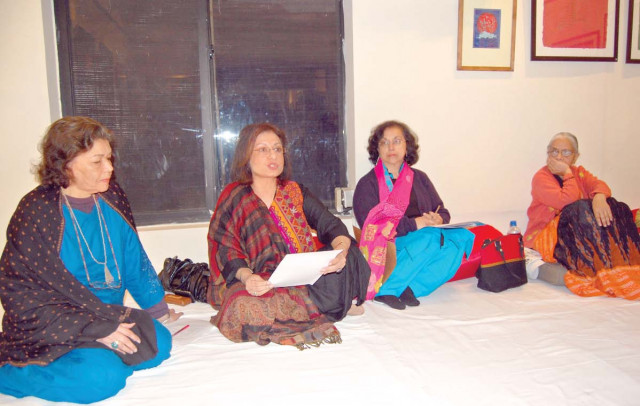National Women’s Day: Thirty years on, their cause becomes dearer
Women Action Forum reminisces about their struggle, terms current era 'scarier, as people get radicalised'.

It was a Saturday morning and members of the Women Action Forum had gathered at the art gallery to commemorate February 12th, 1983, when their peaceful demonstration in Lahore against the Law of Evidence had been baton-charged, propelling widespread condemnation and giving birth to National Women’s Day.
The founder-director of Nomad, Nageen Hyat, hustled about before the programme began, seemingly torn between the demands of supervising the event and the whirlwind of emotions the day was evoking. She stopped for a second to comment on the absurdity of interference by religious groups into a person’s private life, and then went off to oversee the tea table.
An hour later, some 30 odd women, mostly middle-aged and above, had sat down on the floor against plum cushions. Behind them on the walls, art work by 11 female artists, titled “Pakistani Aurat Kay Naam”, was being displayed.
The programme began with Hyatt informing everyone with a trace of annoyance that the politicians who had been invited would not be able to make it. Other important events in the city had probably taken precedence, someone said.
WAF was formed in September 1981 during a time of silence and fear. It was General Ziaul Haq’s regime, the press was muzzled, women’s participation in sports and arts was suppressed and discussions ranged from whether women should even be allowed to drive a car or pass in front of a mosque during prayer times. When two people, Fahmida and Allah Bukhs, were sentenced to death by stoning under the Hudood Ordinance, WAF galvanised into action, helping the two win their case in court.
But now, the participants felt, the environment was even more challenging with the legacy of Zia entrenched among people.
“It is scarier today,” said Nasreen Azhar, founding member of WAF. “Previously, we were opposed to the state, but now, the people themselves have become radicalised.”
The discussion inevitably turned to the blasphemy law and emotions noticeably ran high. One person criticised the political expediency of the ruling party. Another decried the mindset of people.
Arifa Mazhar from Sungi shared a survey she undertook in sector F-10 of Islamabad soon after Salmaan Taseer’s assassination, in which 8 out of 12 people, ranging from shopkeepers to educated young boys and girls, supported the cause which led to his murder
“There is confusion and misinterpretation of Islam,” Mazhar said. “Often, to be on the safe side, many young people choose not to have an opinion at all.”
This silence, the participants said, was a political statement that harmed the cause of progressive elements even more.
Indu Mitha, renowned classical dancer and social activist who had participated in the 1983 protest, shared her memory of that moment, her voice laced with a sense of disappointment as if an opportunity had been lost. “Now, you see women in every field, you see them interacting with everyone with a lot more exposure. But, have we really come forward?”
She added woefully, “It’s for you to work out. It’s my time to go.”
On that reflective note a poetry recital began, wrapping up the brief two-hour event. The women clapped, smiled and cheered each other on, singing a poem advocating women’s rights. The words drifted in the air, an apt demonstration of their resolve-- ever present, but strained under the burden of old and new challenges.
Published in The Express Tribune, February 13th, 2011.



















COMMENTS
Comments are moderated and generally will be posted if they are on-topic and not abusive.
For more information, please see our Comments FAQ